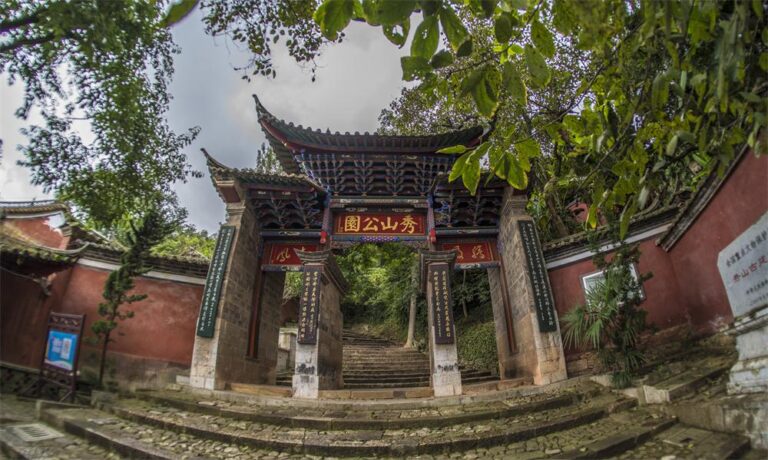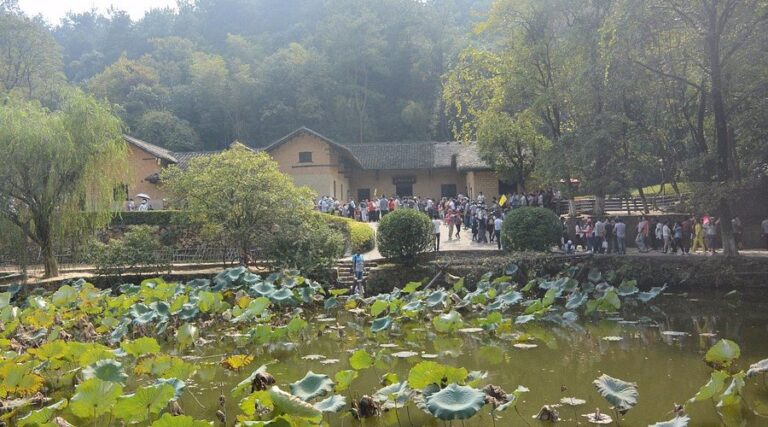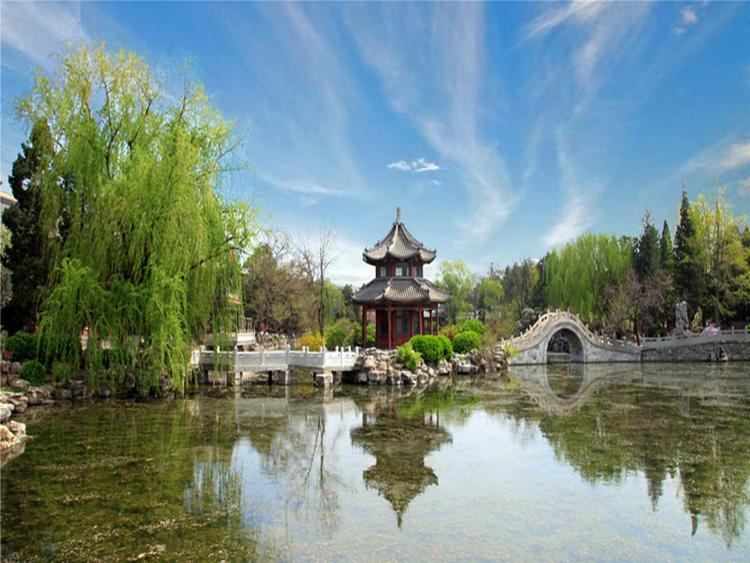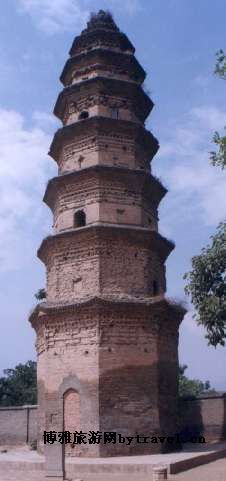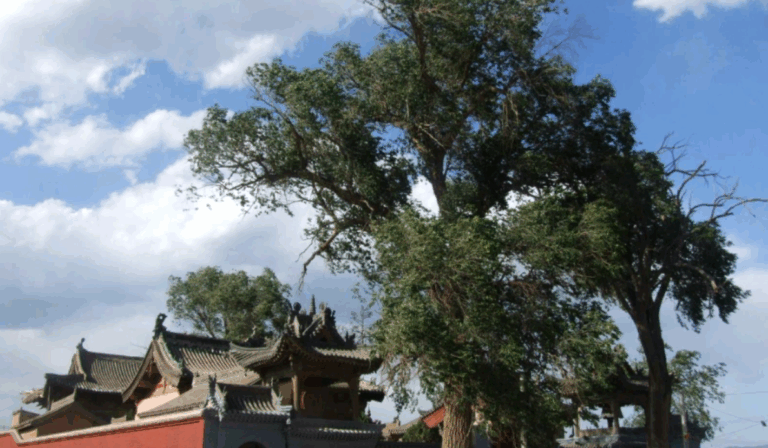Dali Yunnan Yi Gujianzhuqun: A Cultural Odyssey Amidst Breathtaking Landscapes
An Essential Guide to Visiting Dali Yunnan Yi Gujianzhuqun
In This Guide
- An Essential Guide to Visiting Dali Yunnan Yi Gujianzhuqun
- The Rich History of Dali Yunnan Yi Gujianzhuqun
- Main Highlights: What to See at Dali Yunnan Yi Gujianzhuqun
- Planning Your Visit: A Practical Guide
- Tickets, Hours, and Booking
- How to Get There
- Local Cuisine and Accommodation
- Frequently Asked Questions
- Final Thoughts on Your Trip
Nestled in the heart of Yunnan Province, the Dali Yi Gujianzhuqun, or the Dali Ancient Architectural Complex, is a treasure trove of history and culture that beckons travelers from around the globe. This enchanting site is a testament to the rich tapestry of the Bai ethnic culture, showcasing a remarkable collection of ancient buildings that date back to the Ming Dynasty. The intricate designs and traditional Bai architecture reflect a harmonious blend of nature and artistry, captivating visitors with their elegance and charm.
As you wander through the narrow cobblestone streets, you’ll be transported back in time, surrounded by elegant structures adorned with intricate wood carvings and vibrant murals. The complex is more than just a collection of buildings; it represents a living history that has stood the test of time, bearing witness to centuries of cultural evolution. The serene atmosphere of the area, combined with stunning backdrops of the Cangshan Mountains and the shimmering Erhai Lake, creates an idyllic setting for exploration.
Dali itself is a city where the past meets the present, offering a delightful mix of traditional Bai culture and modern influences. From bustling markets filled with handmade crafts to tranquil teahouses where you can sip a cup of local brew, every corner invites discovery. The Dali Yi Gujianzhuqun stands as a symbol of this vibrant heritage, drawing visitors not only to appreciate its architectural beauty but also to engage with the stories and traditions that continue to thrive in this remarkable region.
Whether you’re an architecture enthusiast, a history buff, or simply seeking a picturesque escape, the Dali Yi Gujianzhuqun offers a unique glimpse into the soul of Yunnan. Prepare to be enchanted by the sights, sounds, and flavors of this ancient wonderland, where every step you take unveils a new layer of its captivating narrative.
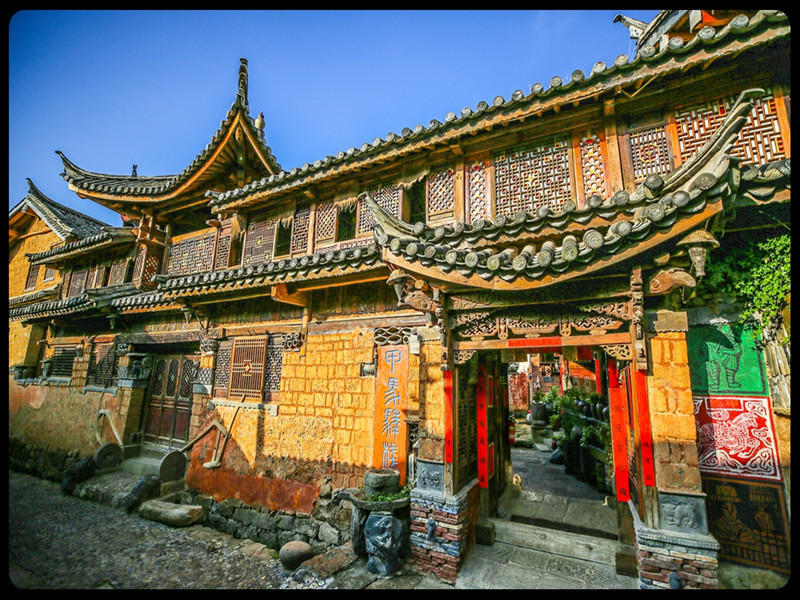
Dali Yunnan Yi Gujianzhuqun.
The Rich History of Dali Yunnan Yi Gujianzhuqun
The ancient architectural ensemble of Dali, known as the Yunnan Yi Gujianzhuqun, is a captivating testament to the region’s rich historical tapestry. Established during the Ming Dynasty in 1382, Dali Old Town, or Yucheng, emerged as a vital cultural and political center. Its strategic location at the foot of the majestic Cangshan Mountains and alongside the tranquil Erhai Lake not only provided natural beauty but also facilitated trade routes that would flourish for centuries.
Dali is one of the earliest historical and cultural cities recognized in China, celebrated for its well-preserved structures and unique architectural style that reflects the heritage of the Bai ethnic group. The city is encircled by impressive ramparts, once formidable in protecting its residents, with gates that once stood as symbols of its historical significance. The original walls, towering at 7.5 meters and thick enough to host four city gates, showcased the engineering prowess of the time.
The architectural style found in Dali is characterized by the Bai people’s traditional houses, which incorporate a harmonious blend of natural materials and intricate designs. These homes often feature courtyards that are adorned with flowers and flowing water, embodying the adage, “every family has flowing water and flowers.” This reflects a deep-rooted cultural value placed on harmony with nature and aesthetics.
As Dali evolved, it became a melting pot of various cultural influences, particularly during the reign of the Nanzhao Kingdom (738-902 AD) and the Dali Kingdom (937-1253 AD). The architectural remains from these periods, particularly the Three Pagodas of Chongsheng Temple, stand as iconic symbols of Dali’s historical narrative, representing the spiritual and artistic zenith of the region.
Throughout the centuries, Dali has witnessed significant events that have shaped its identity. The region served as a strategic military and trade hub during the tumultuous times of the Mongol invasions and later became a vital center for Buddhism, attracting monks and scholars from afar. The influence of Buddhism is evident in the many temples and pagodas that pepper the landscape, echoing the spiritual vibrancy that once thrived here.
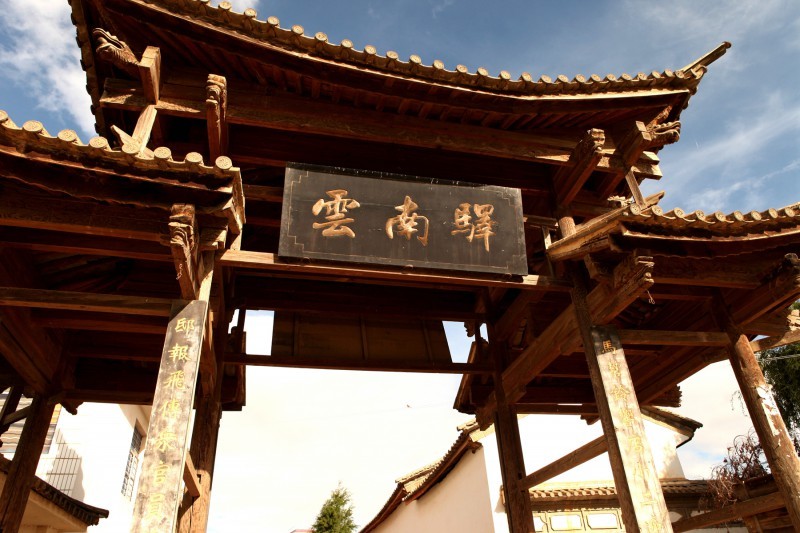
Dali Yunnan Yi Gujianzhuqun.
In modern times, Dali has embraced its historical significance while also adapting to the pressures of modernization and tourism. The preservation efforts of its ancient architecture have allowed the city to retain its charm and continue to attract visitors who are eager to explore its storied past. Today, Dali stands not only as a window into ancient Chinese architecture but also as a living museum of the Bai culture and its enduring legacy.
Visitors to the Yunnan Yi Gujianzhuqun are invited to wander the cobblestone streets of Dali Old Town, where each step resonates with echoes of history, and each structure tells a story of the past. The harmonious blend of natural beauty, traditional architecture, and rich cultural heritage makes Dali a unique destination for those seeking to immerse themselves in the history of Yunnan Province.
Main Highlights: What to See at Dali Yunnan Yi Gujianzhuqun
Dali Yunnan Yi Gujianzhuqun, also known as the Ancient Architecture Complex of Dali, offers a captivating glimpse into the rich history and unique cultural heritage of the Bai ethnic group. Nestled between the majestic Cangshan Mountains and the shimmering Erhai Lake, this historic area is characterized by its well-preserved architecture and vibrant local traditions.
One of the key attractions is the Dali Ancient Town, which dates back to the Ming Dynasty (1382). This picturesque town, with its ancient city walls and charming streets, is a perfect starting point for exploration. Visitors can wander through narrow lanes lined with traditional Bai houses, shops selling exquisite marble products, and eateries serving delicious Bai cuisine. The town is particularly known for the phrase “every family has flowing water and flowers,” reflecting the local habit of cultivating gardens in their courtyards.
Just a short distance from the ancient town lies the Three Pagodas of Chongsheng Temple. These iconic structures are a symbol of Dali and represent a significant part of the region’s Buddhist heritage. Dating back to the 9th century, the pagodas stand elegantly against the backdrop of the Cangshan Mountains, offering a serene atmosphere for reflection and exploration.
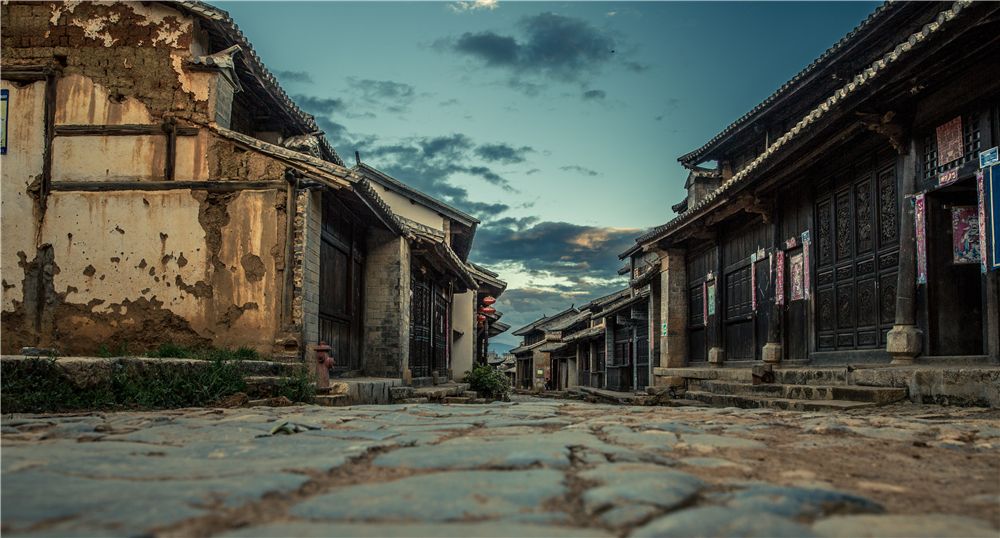
Dali Yunnan Yi Gujianzhuqun.
Nature enthusiasts will be delighted by the breathtaking landscapes surrounding Cangshan Mountain and Erhai Lake. The Cangshan range features 19 peaks, with the highest reaching 4,122 meters. Hiking trails lead through stunning scenery, past crystal-clear streams, and to panoramic viewpoints overlooking the pristine Erhai Lake, often dubbed “a flawless jade in the mountains.” The lake is not only a beautiful sight but also a hub for local fishing villages, where visitors can experience traditional Bai fishing techniques.
Another must-visit is the Butterfly Spring, located about 40 kilometers from Dali. This enchanting site is especially famous during the butterfly mating season, when thousands of butterflies gather, creating a mesmerizing spectacle. Surrounded by lush greenery and ancient trees, the spring is a tranquil spot perfect for leisurely strolls and photography.
For those interested in local culture, Zhou Cheng is a nearby Bai village where you can witness traditional Bai architecture, featuring unique courtyard designs and intricate woodwork. The village is also known for its vibrant tie-dye crafts, a traditional art form that has been passed down through generations.
Whether you’re drawn to the historical significance, stunning landscapes, or cultural richness, Dali Yunnan Yi Gujianzhuqun offers an unforgettable experience that showcases the beauty and diversity of this captivating region.
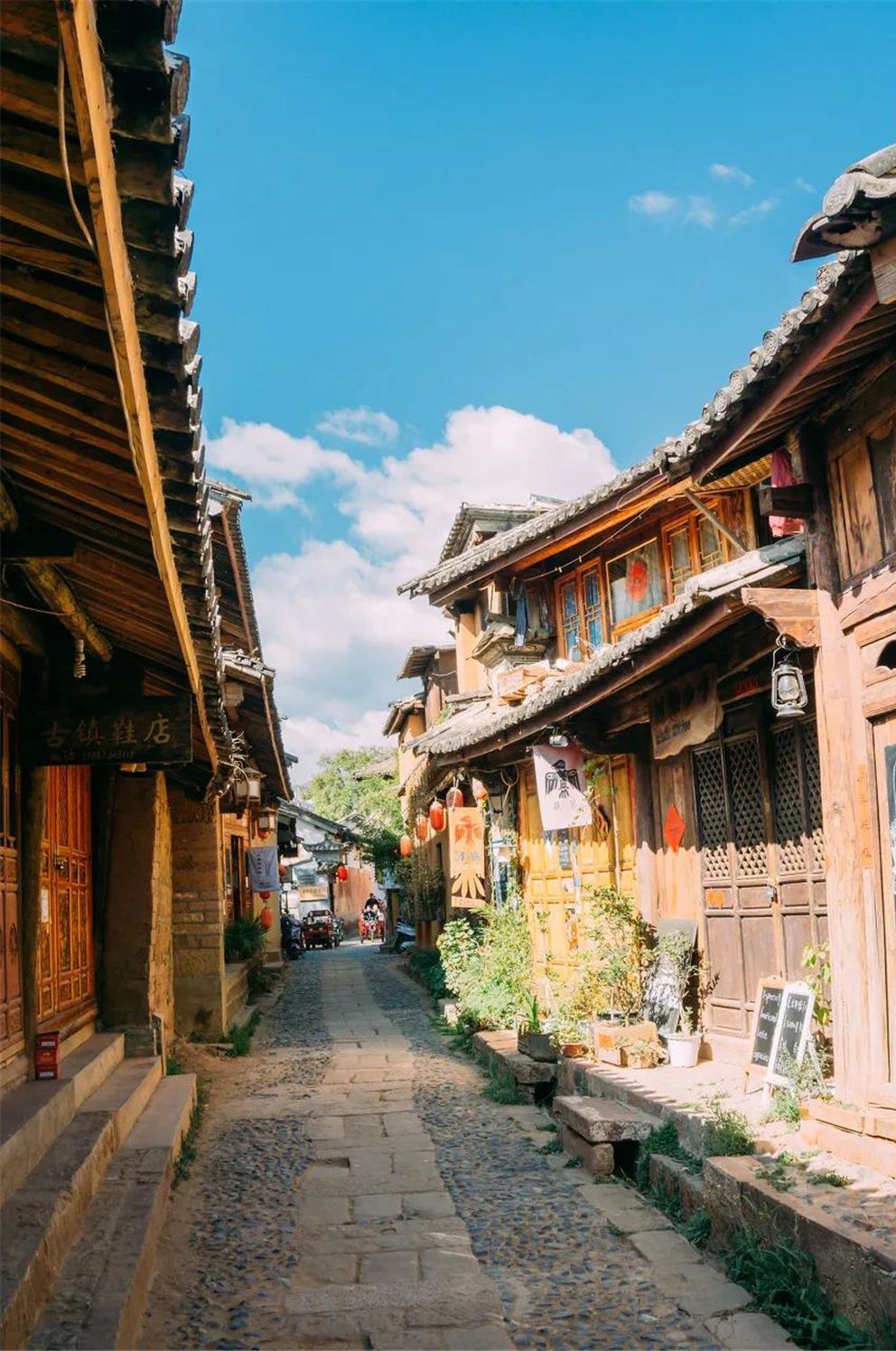
Dali Yunnan Yi Gujianzhuqun.
Planning Your Visit: A Practical Guide
Practical Guide to Dali Yunnan Yi Gujianzhuqun
Visiting the Dali Yunnan Yi Gujianzhuqun (云南驿古建筑群) offers an enchanting glimpse into the rich cultural tapestry and architectural heritage of the Bai ethnic group. This ancient architectural complex is a must-see for travelers interested in history, culture, and stunning natural landscapes. Here’s everything you need to know to make the most of your visit.
Getting There
By Air: Dali Airport is the nearest airport, located approximately 30 kilometers from the ancient town. Daily flights connect Dali to major cities like Kunming and Lijiang, making it accessible for international travelers.
By Train: Dali is also reachable by train from Kunming, which takes about 6 to 8 hours. The scenic ride through Yunnan’s mountains is an experience in itself.
By Bus: Local buses frequently run from Dali city to the ancient town, with travel times typically around 30 minutes. Taxis are also available and can be hired for a more comfortable and quicker journey.
Best Time to Visit
The ideal time to visit Dali is during the spring (March to May) and autumn (September to November) months. The weather is mild and pleasant, perfect for exploring the ancient architecture and enjoying outdoor activities around Erhai Lake and Cangshan Mountain. Summer can be rainy, while winter temperatures can drop significantly, so plan accordingly.
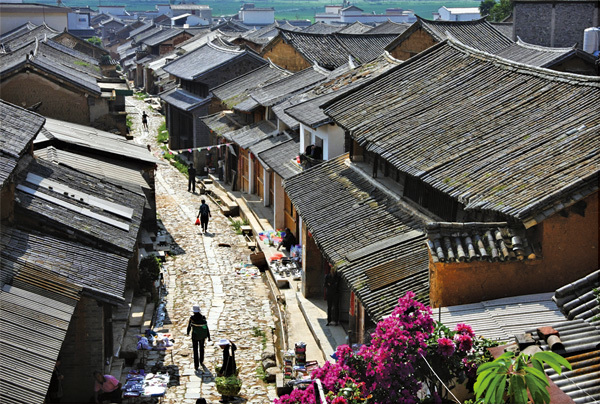
Dali Yunnan Yi Gujianzhuqun.
What to See
-
Dali Ancient Town: Start your journey in the heart of Dali, where you can wander through cobbled streets lined with traditional Bai architecture. Visit local shops selling artisan products, including batik textiles and marble crafts.
-
Cangshan Mountains: These majestic mountains serve as a stunning backdrop to Dali. Hiking trails vary in difficulty and provide breathtaking views. The mountains are also home to several temples and cultural sites.
-
Erhai Lake: A picturesque highland lake that is ideal for cycling, boating, or simply enjoying a leisurely afternoon by the water. Don’t miss the chance to visit the fishing villages around the lake.
-
Three Pagodas of Chongsheng Temple: Just a short trip from the ancient town, these iconic pagodas are a symbol of Dali and offer a glimpse into the region’s Buddhist heritage.
-
Butterfly Spring: A serene spot located about 40 kilometers north of Dali, this spring is famous for its beautiful natural scenery and the annual butterfly festival that attracts thousands of visitors.
Cultural Tips
-
Respect Local Customs: The Bai people have rich traditions and customs. When visiting temples or local homes, dress modestly and ask permission before taking photographs.
-
Bai Cuisine: Don’t miss the opportunity to try local dishes, such as “Er Kuai” (rice cake), “Bai Style Barbecue,” and various mushroom dishes. Street food is also prevalent and worth exploring.
-
Language: While Mandarin is commonly spoken, many locals speak Bai dialect. Learning a few basic phrases in Mandarin can be helpful and appreciated by the locals.
Accommodation
Dali offers a range of accommodation options from budget hostels to luxurious hotels. Staying in a traditional Bai-style guesthouse can enhance your experience. Here are some recommendations:
-
Dali Ancient Town Hotels: Choose from various boutique hotels that reflect local architecture and provide easy access to attractions.
-
Eco-Resorts near Erhai Lake: For a more tranquil experience, consider eco-resorts that offer beautiful lake views and natural surroundings.
-
Hostels: Budget travelers can find numerous hostels in the ancient town, providing a social atmosphere and opportunities to meet fellow travelers.
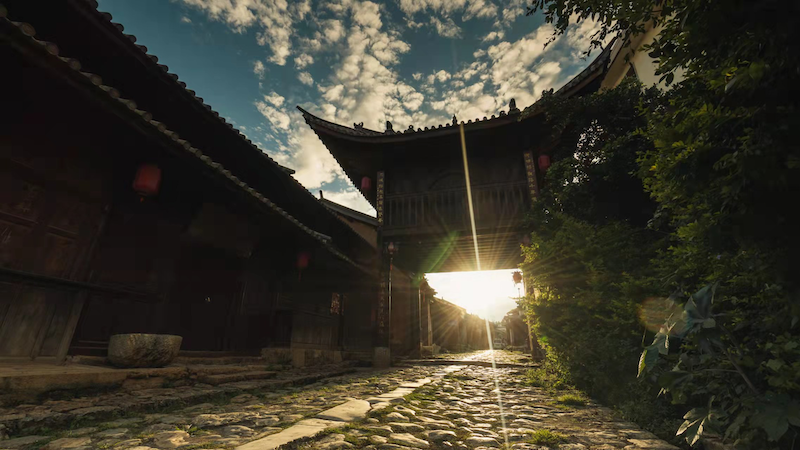
Dali Yunnan Yi Gujianzhuqun.
Transportation
Once in Dali, getting around is convenient.
-
Bicycles: Renting a bike is a popular option to explore the ancient town and surrounding areas at your own pace.
-
Electric Scooters: For those who prefer less physical exertion, electric scooters can be rented easily throughout the town.
-
Taxis and Ride-Hailing Apps: Taxis are available, and ride-hailing apps like Didi Chuxing work well in Dali.
Safety Tips
Dali is generally a safe destination for travelers, but like any tourist area, it’s wise to stay vigilant. Keep an eye on your belongings, especially in crowded places, and be cautious of any scams targeting tourists.
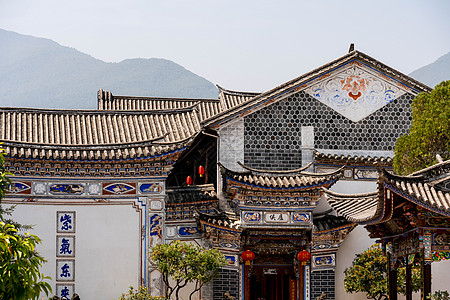
Dali Yunnan Yi Gujianzhuqun.
With its captivating blend of history, culture, and breathtaking landscapes, Dali Yunnan Yi Gujianzhuqun promises an unforgettable adventure for any traveler. Prepare yourself to immerse in the beauty of this unique destination!
Tickets, Hours, and Booking
When planning your visit to the Yunnan Yi Gujianzhuqun, it’s essential to understand the ticketing options available for this historic site. The ancient architecture complex, situated in the picturesque Dali area, offers a glimpse into the rich cultural heritage of the Bai ethnic minority and the region’s storied past.
Ticket Information
-
General Admission: Tickets to the Yunnan Yi Gujianzhuqun typically range from RMB 40 to RMB 60 per person. This fee grants you access to the main areas of the complex, including several notable ancient buildings and scenic spots.
-
Discounts: Reduced ticket prices may be available for students, seniors, and children. It’s advisable to carry valid identification to avail these discounts.
-
Opening Hours: The site is generally open from 8:00 AM to 6:00 PM daily. However, it is wise to check for any seasonal changes in hours or special closures.
-
Guided Tours: For those interested in a deeper understanding of the architecture and history, consider booking a guided tour. Prices for guided tours can vary, often starting around RMB 100 per person, which includes an experienced guide who can provide invaluable insights into the site’s significance.
-
How to Purchase Tickets: Tickets can be purchased at the entrance of the complex. To avoid long queues, consider arriving early in the day. Additionally, some local travel agencies or online platforms may offer advance booking options, which can be particularly useful during peak tourist seasons.
-
Transportation Access: The Yunnan Yi Gujianzhuqun is easily accessible via public transportation from Dali City. Local buses and taxis frequently run to the site, making it convenient for visitors.
Make sure to plan your visit accordingly, as the captivating beauty and historical importance of the Yunnan Yi Gujianzhuqun are not to be missed during your travels in Dali!
How to Get There
Getting to and around Dali Yi Gujianzhuqun, also known as the Ancient Architecture Group in Dali, Yunnan, is an essential aspect of your travel experience. This enchanting region, renowned for its stunning natural beauty and rich cultural heritage, offers various transportation options to help visitors navigate its historical sites and picturesque landscapes seamlessly.
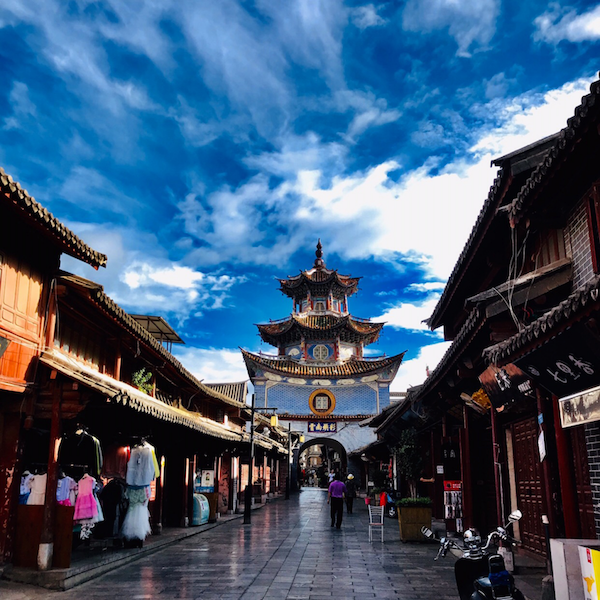
Dali Yunnan Yi Gujianzhuqun.
Arriving in Dali
By Air:
Dali is served by the Dali Airport (DLU), which connects it to major cities such as Kunming and Lijiang. Regular flights operate from Kunming Changshui International Airport, making it convenient for international travelers to access Dali. Upon arrival, you can take a taxi or pre-arranged shuttle service to your accommodation or the Ancient Architecture Group.
By Train:
Dali is also accessible by train, with the Dali Railway Station catering to both high-speed and regular trains from Kunming. The train journey offers stunning views of the Yunnan countryside and usually takes around 2-3 hours. From the train station, local buses and taxis can transport you to your destination.
By Bus:
Long-distance buses offer another option to reach Dali. Buses from nearby cities such as Lijiang or Kunming run frequently and are an affordable choice for budget travelers. The main bus station in Dali is well-connected to the Ancient Architecture Group and other local attractions.
Getting Around Dali
Once in Dali, several transportation modes can help you explore the area:
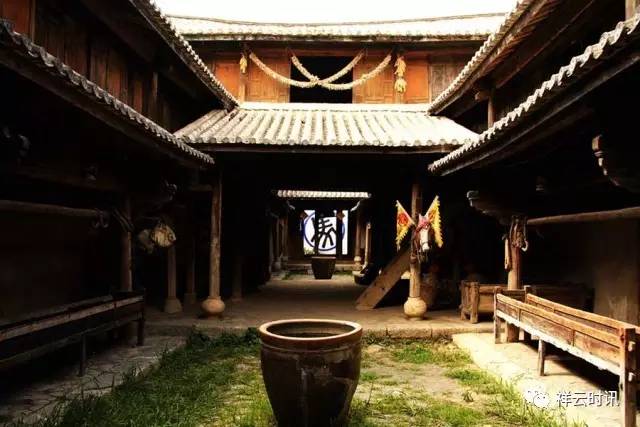
Dali Yunnan Yi Gujianzhuqun.
Public Buses:
Dali has a reliable public bus system that connects major tourist attractions, including the Ancient Architecture Group, Erhai Lake, and Cangshan Mountain. Fares are quite low, making it an economical option for travelers.
Taxis and Ride-Sharing Services:
Taxis are readily available and relatively inexpensive. Make sure to agree on a fare before your journey or ensure the meter is running. Additionally, ride-sharing services like Didi are operational in Dali, providing a convenient alternative for navigating the city.
Bicycles and Electric Scooters:
For a more immersive experience, consider renting a bicycle or an electric scooter. Many rental shops are located around Dali Ancient Town, allowing you to explore at your own pace. Cycling around Erhai Lake is particularly popular, offering breathtaking views and a taste of local life.
Walking:
The Dali Ancient Architecture Group is best explored on foot. Strolling through the ancient streets, you can fully appreciate the intricate designs of the buildings and the vibrant atmosphere of local markets and eateries.
Tips for Transportation
- Language: English is not widely spoken, so having a translation app handy or a phrasebook can be helpful for communication with drivers and locals.
- Cash: While some taxis and businesses accept mobile payments, it’s wise to carry cash in local currency, as many smaller establishments may not.
- Plan Ahead: Popular attractions may require advance booking for certain tours or activities, especially during peak seasons.
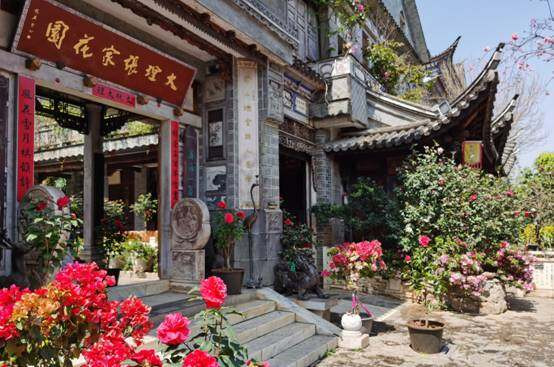
Dali Yunnan Yi Gujianzhuqun.
With these transportation options at your disposal, exploring the captivating Dali Yi Gujianzhuqun and its surrounding landscapes will be a breeze, allowing you to soak in the rich history and natural beauty of this enchanting region.
Local Cuisine and Accommodation
When exploring the historic beauty of Dali Yunnan Yi Gujianzhuqun, visitors are treated to an array of culinary delights and comfortable accommodations that reflect the region’s rich cultural heritage.
Culinary Delights
Dali is renowned for its unique Bai ethnic cuisine, which emphasizes fresh ingredients and bold flavors. As you wander through the ancient town, be sure to sample the following local specialties:
- Dali Stone Pot Chicken: A savory dish served in a stone pot, featuring tender chicken, fresh vegetables, and a medley of spices that create a warm and hearty meal.
- Bai-style Rice Noodles: These noodles are typically served in a rich broth and garnished with fresh herbs, pickled vegetables, and sometimes meat. They are a perfect comfort food, especially on cooler days.
- Yunnan Cheese: Known locally as “rushan,” this soft cheese is often grilled and served with honey or chili sauce. It makes for a delicious snack or appetizer.
- Erhai Fish: Caught fresh from the nearby Erhai Lake, this fish is often grilled or steamed, allowing its natural flavors to shine. Pair it with local herbs for an authentic taste.
- Bai Ethnic Dishes: Various small eateries throughout the ancient town serve traditional Bai dishes, including stir-fries and stews that incorporate local ingredients like mushrooms, herbs, and wild vegetables.
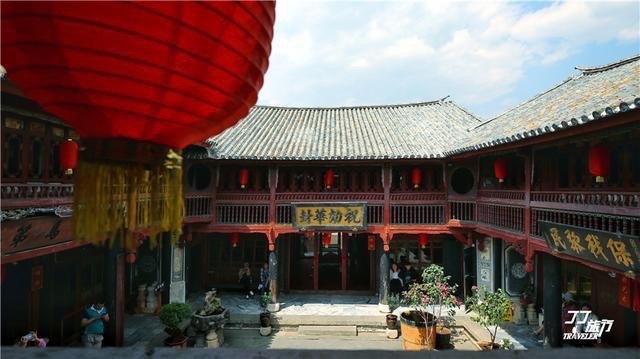
Dali Yunnan Yi Gujianzhuqun.
For those looking for a more modern dining experience, Dali also offers a variety of cafes and restaurants that serve international cuisine, ranging from Italian pasta to Western-style breakfasts.
Where to Stay
Accommodation options in Dali cater to a range of tastes and budgets, from charming guesthouses to more upscale hotels. Here are some recommendations:
-
Traditional Guesthouses: Many guesthouses in the ancient town are built in the traditional Bai style, providing an authentic experience. Look for places like Dali Ancient Town Hotel, which offers cozy rooms, beautiful courtyards, and a friendly atmosphere.
-
Boutique Hotels: For a blend of modern comfort and local charm, consider staying at The One Resort Dali. This boutique hotel features stylish rooms with stunning views of the surrounding mountains and Erhai Lake, as well as a restaurant serving both local and international dishes.
-
Budget Options: If you’re traveling on a budget, there are many hostels and guesthouses available at reasonable prices. Dali Dreamland Hostel is a popular choice among backpackers, providing clean accommodations and a vibrant communal atmosphere.
-
Luxury Resorts: For those seeking a more luxurious experience, InterContinental Dali Erhai offers upscale amenities, including a spa, fine dining, and breathtaking views of Erhai Lake. This resort is perfect for travelers looking to indulge in comfort and relaxation.
In Dali, the combination of delightful food and welcoming accommodations allows you to fully immerse yourself in the local culture while enjoying the stunning natural surroundings. Whether indulging in a hearty meal or resting in a traditional courtyard, your stay in this enchanting town will surely be memorable.
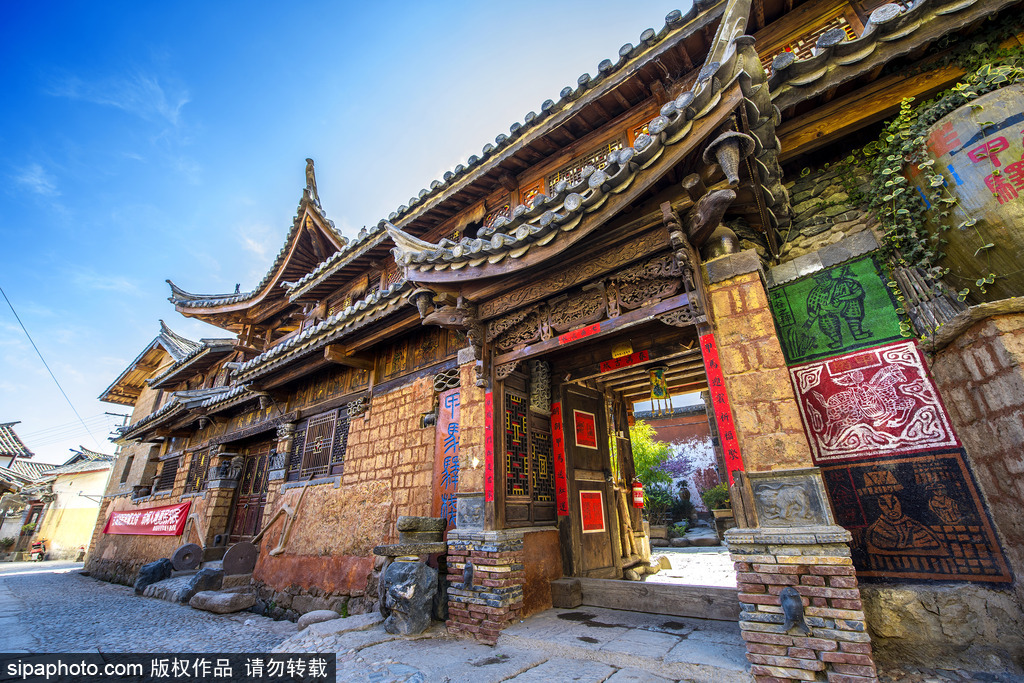
Dali Yunnan Yi Gujianzhuqun.
Frequently Asked Questions
Frequently Asked Questions about Dali Yunnan Yi Gujianzhuqun
-
What is the best time to visit Dali Yunnan Yi Gujianzhuqun?
The ideal time to visit is from March to May and September to November when the weather is mild and pleasant. During these months, you can enjoy the beautiful scenery without the heavy rains of summer. -
How do I get to Dali Yunnan Yi Gujianzhuqun?
Dali is accessible by plane, train, or bus. The Dali Airport connects with major cities in China. If traveling by train, you can take a high-speed train to Dali from Kunming. Local buses and taxis are available to take you to the historical architecture complex. -
Are there any entrance fees?
Yes, there may be entrance fees for certain attractions within the Dali Yunnan Yi Gujianzhuqun area. It’s advisable to check specific sites for updated pricing information before your visit. -
What should I wear when visiting?
Dress in layers, as temperatures can vary significantly throughout the day. Comfortable walking shoes are recommended due to the cobblestone streets and uneven terrain. -
Can I find accommodations nearby?
Yes, there are various accommodation options ranging from traditional guesthouses to modern hotels in the Dali area. Many are designed in the local Bai architectural style, offering an authentic experience. -
Is it possible to explore the area on foot?
Absolutely! Dali Yunnan Yi Gujianzhuqun is best explored on foot. The ancient architecture and scenic surroundings provide a picturesque backdrop for leisurely strolls. -
What cultural experiences can I expect?
Visitors can enjoy local Bai culture through traditional music, dance performances, and crafts like tie-dye and stone carving. Don’t miss trying local Bai cuisine, which features unique flavors and dishes. -
Are there guided tours available?
Yes, guided tours are available and can enhance your experience by providing in-depth information about the history and significance of the architecture and the culture of the Bai people. It’s recommended to book these in advance, especially during peak travel seasons.
Final Thoughts on Your Trip
In the heart of Yunnan province, the Dali Yi Gujianzhuqun stands as a testament to the region’s rich cultural heritage and architectural prowess. This ancient ensemble not only showcases the artistry of traditional Bai architecture but also tells the stories of a diverse community that has thrived for centuries amidst stunning natural beauty. Visitors to Dali are not merely spectators; they become part of a living narrative that intertwines history, culture, and nature.
As you wander through the cobbled streets, breathe in the crisp mountain air, and gaze upon the majestic Cangshan Mountains and the shimmering Erhai Lake, you will find that Dali offers more than just picturesque landscapes. It invites you to embrace the slow rhythm of life, savor local flavors, and connect with the warmth of its people. The ancient structures, imbued with the spirit of the Bai culture, reflect a harmonious blend of history and modernity, making Dali a truly unique destination.
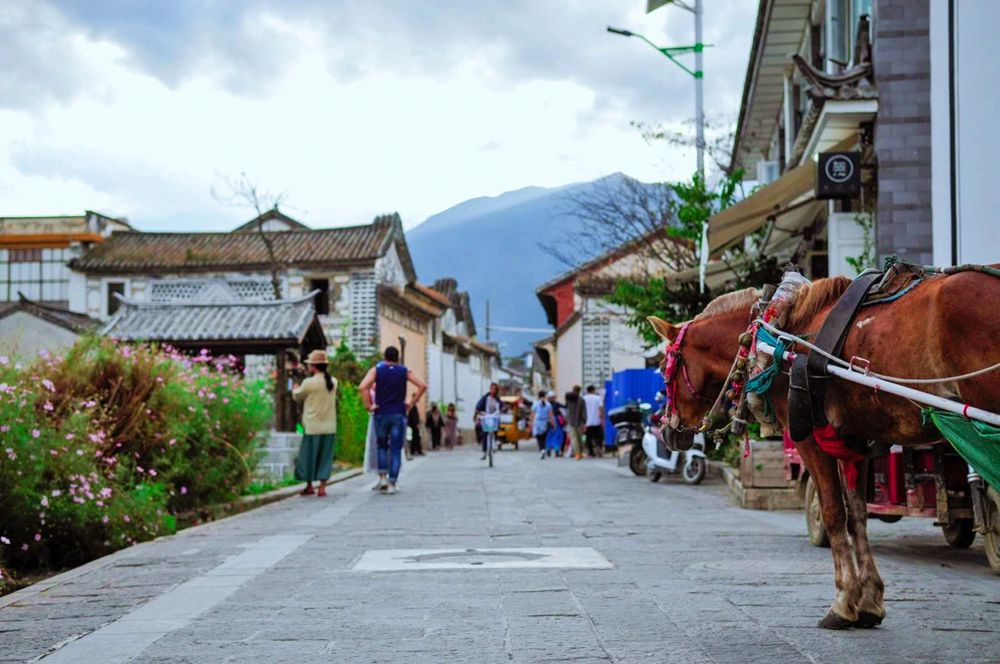
Dali Yunnan Yi Gujianzhuqun.
Whether you are an adventurer seeking the thrill of mountain hikes or a seeker of tranquility looking to unwind by the lake, Dali Yi Gujianzhuqun has something for everyone. As you conclude your journey, let the beauty and stories of this enchanting place linger in your heart, igniting a desire to return and explore more of its hidden treasures. Dali is not just a destination; it is an experience that beckons you to discover, reflect, and cherish.
